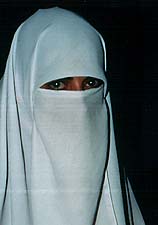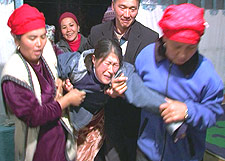The first film about the Kyrgyz tradition of bride kidnapping takes viewers…
Crimes of Honour

- Description
- Reviews
- Citation
- Cataloging
Across the Islamic world, hundreds of women are shot, stabbed, strangled or burned to death each year by their male relatives, because they are thought to have dishonored their families by engaging in unacceptable relationships. Filmed in Jordan and on the West Bank, CRIMES OF HONOUR documents the terrible reality of femicide - the killing of sisters or daughters suspected of losing their virginity, for having refused an arranged marriage or having left a husband. Even if a woman is raped, abused, or is the victim of gossip, she may pay the terrible price.
Rania Arafat fled from her home after falling in love with a man her family did not approve of. Afraid of violence, she lived in hiding. Eventually, after promises of forgiveness and a new beginning, believing in the words of her mother and father, Rania agreed to return - though only after meeting at a police station, where one of her brothers signed a document promising not to harm her. But instead of a joyous reunion, Rania was murdered, shot in the head by another brother while on the way home. She was still a virgin.
CRIMES OF HONOUR tells the stories of women like Rania, hiding from their families, fearing for their lives, as well as the men who commit femicide. One such man, interviewed in prison, discusses his reasons for murdering his sister.
Femicide, although having no basis in Islamic teachings, is on the rise in some countries. CRIMES OF HONOUR delves into class and religious issues that infuse the debate, as well as the possible origins of femicide.
But some women are fighting for change. CRIMES OF HONOUR profiles three women committed to human rights, who attempt to provide protection and assistance to those in danger. Rana Husseini, an award winning reporter for the Jordan Times, investigates the crimes, documents and reports on the stories of terrified young women. Jordanian Human Rights Lawyer Asma Khader fights in the courts to protect threatened women, and for longer prison sentences for those guilty of femicide (Judges often hand down sentences as short as a year). And, Professor Nadera Shalhoub-Kervorkian founded the Women's Work Center for Legal Aid and Counseling in the West Bank. Here she provides aid and counseling to frightened women with no place to turn.
This wrenching new film captures the horrific tragedy of this practice, personal reactions to it, and examines the wider societal response. From the courthouses to the jails to the hiding places of terrified young women, the film puts before the viewer the horrific facts, and the accounts of three women fighting to end CRIMES OF HONOUR.
Rania Arafat fled from her home after falling in love with a man her family did not approve of. Afraid of violence, she lived in hiding. Eventually, after promises of forgiveness and a new beginning, believing in the words of her mother and father, Rania agreed to return - though only after meeting at a police station, where one of her brothers signed a document promising not to harm her. But instead of a joyous reunion, Rania was murdered, shot in the head by another brother while on the way home. She was still a virgin.
CRIMES OF HONOUR tells the stories of women like Rania, hiding from their families, fearing for their lives, as well as the men who commit femicide. One such man, interviewed in prison, discusses his reasons for murdering his sister.
Femicide, although having no basis in Islamic teachings, is on the rise in some countries. CRIMES OF HONOUR delves into class and religious issues that infuse the debate, as well as the possible origins of femicide.
But some women are fighting for change. CRIMES OF HONOUR profiles three women committed to human rights, who attempt to provide protection and assistance to those in danger. Rana Husseini, an award winning reporter for the Jordan Times, investigates the crimes, documents and reports on the stories of terrified young women. Jordanian Human Rights Lawyer Asma Khader fights in the courts to protect threatened women, and for longer prison sentences for those guilty of femicide (Judges often hand down sentences as short as a year). And, Professor Nadera Shalhoub-Kervorkian founded the Women's Work Center for Legal Aid and Counseling in the West Bank. Here she provides aid and counseling to frightened women with no place to turn.
This wrenching new film captures the horrific tragedy of this practice, personal reactions to it, and examines the wider societal response. From the courthouses to the jails to the hiding places of terrified young women, the film puts before the viewer the horrific facts, and the accounts of three women fighting to end CRIMES OF HONOUR.
Related Films
Bride Kidnapping in Kyrgyzstan
Stories of Honor and Shame
Through a series of remarkable personal accounts, fifteen women reveal…



